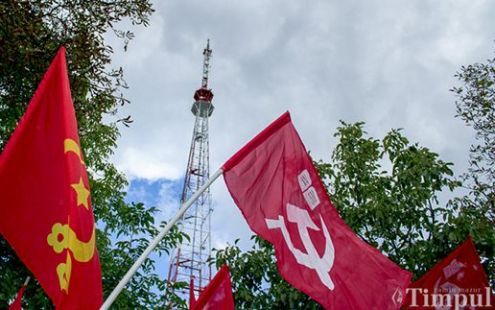
Russia and the Moldovan Communists’ Red October (Part One)
Publication: Eurasia Daily Monitor Volume: 10 Issue: 176
By:

During the summer months, Moldova’s still-strong Communist Party threatened to stage what it terms a “velvet revolution” by October, so as to derail the conclusion of Moldova’s association agreements with the European Union. The “Red October’s” minimal goal is to pre-empt the association agreements’ conclusion, which is planned for late November at the Vilnius summit. The maximum goal is to paralyze or even topple Moldova’s government. The Communist Party held power from 2001 through 2009, and hopes to regain power by capitalizing on social discontent and Russia-oriented sections of Moldova’s populace. The party’s regime-change scenario combines obstructing the parliament (where the Communists hold 35 seats, and russsophone leftist groups another 4 or 5 seats, out of 101) with extra-parliamentary “civil disobedience,” so as to topple the government and trigger pre-term parliamentary elections. The Communist Party bases its hopes on public opinion surveys that consistently show roughly equal leanings toward the EU and toward Russia, respectively, among Moldova’s populace.
For its part, the Russian government calculates its possibilities to aggravate Moldova’s problems through punitive economic measures. The Kremlin hopes to coerce Moldova to reconsider its unambiguous European choice, or at least to allow Russian capital to seize key positions ahead of the association agreements’ completion (e.g., an obscure Russian entity is now poised to take over Chisinau’s International Airport in a nontransparent procedure, helped by one faction in the Moldovan government). More broadly, Russian economic measures against Moldova could aggravate social discontent and political instability, directly or indirectly aiding the Communists’ regime-change efforts. Neither the Communists nor Moscow could attain their respective goals without coordinating their efforts with each other. However, a decade-old mutual mistrust continues to affect their current relationship.
The Communist Party has launched its “Red October” already since late September, and it looks unimpressive in this initial phase. Groups of party members and sympathizers, always led by Communist parliamentary deputies and occasionally by former president Vladimir Voronin himself, are staging demonstrations and pickets in front of government institutions in Chisinau. Outside the capital, such groups have been blocking highway traffic at several locations for a few hours at a time, and in one case ongoing for several days (Omega news agency, Jurnal TV, Unimedia, Infotag, September 23–October 3).
The groups range in size from several dozen to several hundred, carry red flags and somewhat modernized Soviet symbols, are mostly russophone, and about one half of the participants are young (reflecting the Communist Party’s purposeful recruitment among urban youth). Speakers at these events—and the Communists’ appeals generally—denounce official corruption, “oligarchs” and “[economic] criminals in power,” and European support for the incumbent Moldovan government. They demand the government’s resignation, prosecution of its members, and the holding of pre-term parliamentary elections. They promise to shift budgetary priorities toward social protection, if the Communists regain power (Omega news agency, Jurnal TV, Unimedia, Infotag, September 23–October 3).
Their party’s message emphasizes the corruption issue overwhelmingly, with a collateral emphasis on defending “moral values” against Western intrusions. On this issue, Communists and traditionalist Orthodox Christians join forces denouncing EU-imposed legislation on the protection of homosexuals’ civil rights. The Communist Party stands to gain some previously non-political Orthodox voters by exploiting this issue (the Liberal-Democrat Party of Vlad Filat consciously accepted serious political risks in spearheading the adoption of that legislation).
The Communists seem to avoid comparing the economic advantages that the EU or Russia (with its Customs Union), respectively, hold in store for Moldova. The party’s message has a narrow, short-term focus on regime change, without attempting to outline program alternatives (these would be reserved for the pre-term parliamentary elections, if the scenario works out). It was Voronin’s Communist Party, after all, which launched Moldova’s European orientation and instituted the Moldova-EU Action Plan in 2003. The party shifted toward a double-vector stance while in the opposition since 2009. It maintains the position that Moldova should pursue its interests with the EU, Russia, or both, depending on opportunities. The party and its voters do not yet realize that Russia’s (and its Customs Union’s) current offer is incompatible with the EU’s offer of association and free trade agreements, as Armenia has just realized when repudiating Europe in favor of Russia (see EDM, September 6, 11, 18).
Civil disobedience and dual-power tactics figure prominently in the party’s discussions, but are not gaining practical traction thus far. The Communist Party launched a Civic Congress last year, designed as an umbrella of civil-society groups and locally elected officials under the Party’s coordination (ITAR-TASS, May 1, 2012). The Civic Congress aims to mobilize grass-roots support beyond the Communist Party’s own membership, identify non-political issues for cooperation with non-communist groups, and create the appearance of broader support for the Party on the model of front organizations. The Civic Congress also tried out a few symbolic dual-power moves some months ago (e.g., illegally hoisting Party flags on local Communist-controlled seats of authority). But the Civic Congress seems rather evanescent at this moment. Its low visibility makes the Communists’ efforts look narrowly partisan, rather than popularly based despite their populist rhetoric.
Small parties of the russophone left are eager to join the Communist Party in this campaign. Three such parties are active, two of them in parliament (see above) and one extra-parliamentary. They propose to conclude political agreements and eventually a political bloc with the much larger Communist Party, so as to escape from marginality by riding its coattails. Communist leaders, however, refuse party-to-party cooperation on that basis thus far. Instead, they target those smaller parties’ voters for absorption into the Communist Party’s own electorate. At present, that electorate is mostly Russian/”Russian-speaking” at the hard core, and largely Moldovan at the softer peripheries.
Should Moscow decide to subsidize political parties in Moldova, the Communists and the smaller russophone-left parties would probably compete over such funding against each other. This is an additional reason for the Communist Party to render the small ones irrelevant and useless to possible patrons in Moscow. For now, the Kremlin directly supports the operations of some Russian-nationalist non-governmental organizations (NGO) in Moldova, as well as some “political technologists’” activities in Chisinau. There are no indications of direct coordination between Moscow and the Moldovan Communist Party thus far.




